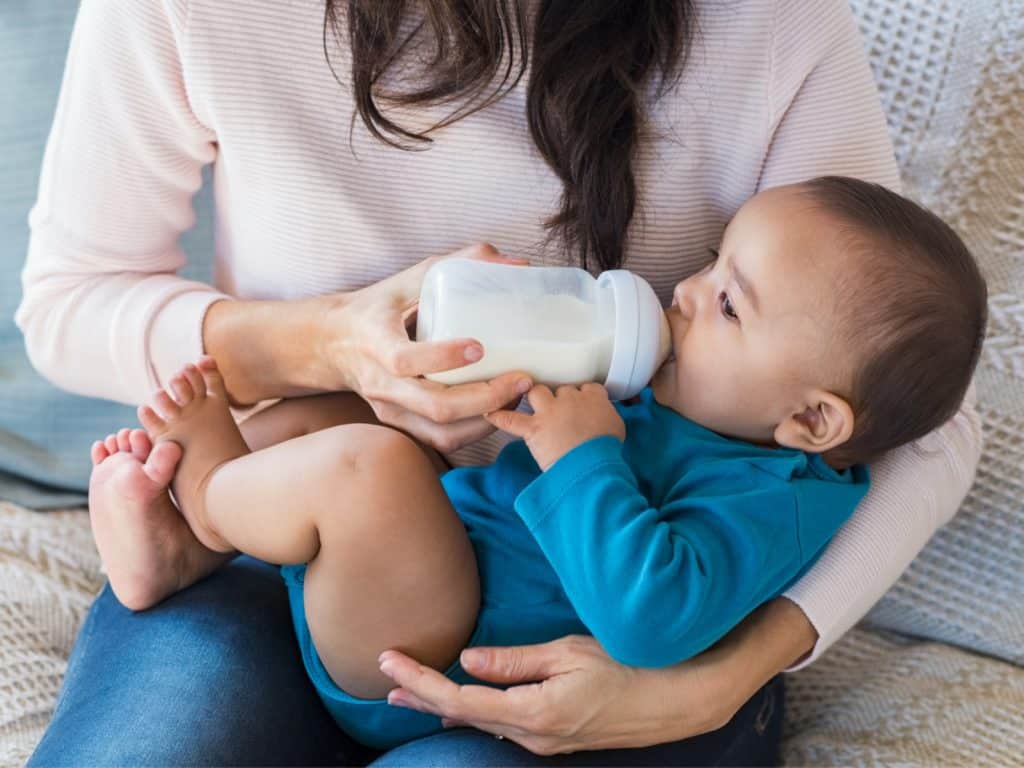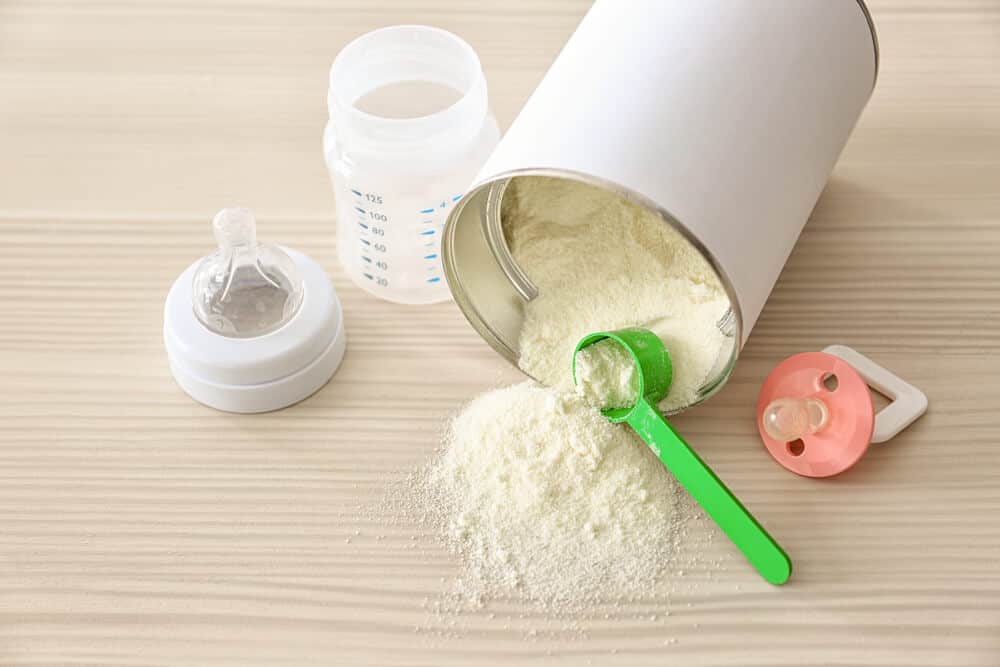Is it normal for babies to be so gassy? The answer is yes! As a matter of fact, babies pass gas anywhere from 13 to 21 times per day!
Adjusting feeding positions, massaging the baby’s tummy, and diet changes can all help to break up the gas and provide relief. Additionally, parents can try feeding their baby smaller meals more often, or burping them after each feeding.
Whether you’re a first-time parent or a seasoned pro, watching your newborn writhe in pain from gas can be heartbreaking. Luckily, there are a few things you can do to help ease their discomfort. Here’s a quick guide to natural newborn gas remedies.

As a new mom, I expected issues with sleepless nights and blow outs but I was completely blown away how much of an issue baby gas was.
Call me crazy, but I didn’t realize my baby’s little digestive system would be such a source of discomfort. As soon I realized baby gas was going to be a problem, I immediately wanted to know every newborn baby gas problem home remedy!
What Is Baby Gas?
Gas is the result of air getting trapped in your baby’s stomach due to the digestion process or when your baby swallows a lot of air.
There are lots of opportunities for your baby to take in air, for example, while they are feeding or if they are crying for extended periods of time.
Causes of Baby Gas
Drinking from a bottle too fast can cause gas because the baby can gulp the milk down too quickly.
Additionally, drinking from a nipple that has a flow that is too slow, can cause the baby to gulp extra air when feeding.
Drinking a formula prepared bottle that has too many air bubbles
Not tolerating the current baby formula well
Eating foods known to cause gas or mom is eats something that causes gas and it makes it way into her breastmilk.
Signs Your Baby Has Gas
Babies can have trouble with gas starting in the early weeks all the way through to the toddler stage. The peak time that baby gas is the worst is around 4 to 12 weeks.
It can be very hard to see your baby screaming in pain from gas, but that can often be the first and most obvious sign.
Your baby can’t exactly tell you that gas is making them uncomfortable so here are some other signs to look for:
Fussiness
Bloating
Hard Tummy
Passing gas/farting
Red faced
Clenched Fists
Lifting their legs/stretching their body out/arching back
If helping your baby to pass gas relieves them of discomfort and they calm back down, then you can be sure the problem was gas.
However, constipation looks like a lot like gas. It won’t be relieved by passing gas. You will know if your baby is constipated by observing their stool. Is it hard? Does your baby seem to be struggling to have a bowel movement?
How Can I Relieve My Baby’s Gas Naturally?
Here are some tips on how to get rid of baby gas fast.
1. Check the feeding position

When you’re bottle feeding your baby, try and prevent the gas problem before it starts.
You can do this by positioning your baby with their head elevated. Try and keep your baby’s head above their stomach.
Use a nursing pillow to make positioning easier on your arms and comfortable for your baby.
2. Change bottle or nipple if necessary

Some bottles are specially made to minimize air bubbles, like Dr. Brown’s, which has a special vent system to eliminate negative pressure and air bubbles.
This does mean there are extra bottle pieces to wash but for some moms this a minor inconvenience for a less gassy baby!
The Munchkin Latch Anti Colic bottles are a simpler set up and feature a valve at the bottom of the bottle that prevents air bubbles from traveling through the milk.
Pay attention to the milk flow from the nipple. Most bottle systems have levels or numbers on the nipples to indicate the suggested age you should use each nipple.
My favorite slow flow nipples are these by Dr. Browns or these naturally shaped Comotomo nipples.
3. Baby massage
Massage is an amazing newborn baby gas problem home remedy that can help them pass those trapped gas bubbles.
There are many different baby massage techniques. You can try the I Love You massage technique where you mimic writing the letters, I, L and Y on your baby’s stomach.
4. Use baby gripe water

Gripe water is herbal supplement for stomach discomfort, commonly made from herbs like fennel and ginger.
Gripe water is generally safe for relieving pain from gas and digestion problems. Be sure to look for a formula that is specifically formulated for babies, and does not include alcohol, sugar or artificial flavors.
I like the Little Remedies brand because it doesn’t include anything you would be concerned about giving your baby.
5. Try feeding your baby earlier
If you’re keeping up with your baby’s sleeping and eating schedule, you may be able to time the feedings so that they’re predictable.
Feeding your baby before they get into a full-on hungry cry may help them relax and not gulp down a bottle.
Anticipating when your baby wants to nurse or bottle feed, can help them relax and feed at a leisurely pace.
For the first few months of my daughter’s life, I was very aware of the clock and the times she needed to be fed. At first, I was using an app, but as the weeks went on I was able to remember on my own for the most part.
6. Move your baby’s legs in a bicycling motion

Lay your baby on their back and move their legs in a pedal motion. This might look funny, but it really will help physically move your baby’s gas along!
7. Consider diet changes
If you’re breastfeeding, you may be eating foods that your baby is sensitive to and this could cause your baby to be gassy.
Some common foods that can cause your baby to be gassy include:
Dairy
Soy
Gluten
Eggs
Nuts

If you’re not for sure what’s causing the gas, try cutting one specific food out of your diet for a week at a time to see if that helps.
8. Make sure your baby’s formula isn’t the issue
There are special formulas for gassy babies and these might help your little one digest their milk better. These gentle formulas have partially broken down proteins and probiotics.
My daughter was on one of these formulas and I have noticed that they can be a bit more pricer than “regular” formula.
Related: Formula Feeding Tips and Tricks To Make Your Life Easier

If your baby does better on this type of formula, there are a couple of ways to save on this. You can sign up for coupons from the manufacturer or get samples from your pediatrician’s office.
Keep an eye out for sales, baby deals or Amazon subscribe and save.
9. Tummy time for gentle pressure
Gentle pressure is a wonderful trick to relieve stomach discomfort. The good thing is that there is more than one way to do it! Tummy time is another option.
Yes, tummy time is good for building back and shoulder muscles, but its a great way to help your baby pass gas.
Do tummy time while supervised, lay your baby across your lap or on a tummy time mat and gently rub their back in a soothing motion.
10. Offer infant gas drops

Gas drops have simethicone in them, which is known to break up gas bubbles. These drops can be mixed into formula or breastmilk.
11. Try a comforting carry position
Babies love to be held and being close to you is comforting! Snuggle your baby in between your chin and chest and sway back and forth.
Another interesting position is called the colic carry. You turn your palm up, lay your baby on your forearm with their head towards your elbow. Gently tap their back or give them a bounce to help move that gas along.
12. Burp mid feeding and after feedings

Stopping to take breaks and burp your baby is honestly a game-changer. You don’t have to wait until your baby is completely done with their bottle to burp them.
Every two to three ounces, stop feeding and bring your baby into the burping position of choice. Whether that’s over the shoulder, across your lap or sitting up, just help them get that air out.
Comforting A Gassy Baby At Night
Baby gas pain is a problem at any time of the day, but it can be especially hard at night. You’re trying to get some sleep, but gas and air bubbles are keeping both of you awake.
Your baby’s digestive system is working hard at night while they’re sleeping to develop and also digest milk.

You can try a quick newborn baby gas problem home remedy like as mentioned previously. Remember, prevention is your best bet at night.
Before bedtime and during the night, try preventing air during feeding. Burp your baby during and after feeding.
Baby Gas Relief and Comfort
If you’re stressing out over a gassy baby, just remember it won’t always be this difficult. Eventually, babies start developing their own self burping skills. When they start sitting up on their own, burping gets easier.
You will get the hang of this in no time and be able to relieve your baby’s gas quickly. If you’re able to comfort your baby through any of the techniques we’ve discussed, you’re doing okay!
Remember it’s okay to learn and adjust as you go. That’s so important and another part of figuring out how to survive the newborn stage!



